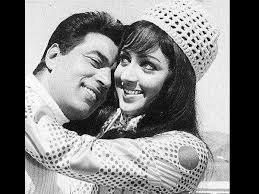Starting from the black and white era to the present digital era, the romance has blossomed. As the generation changes the new actors take the throne of the king of romance. Shahrukh Khan is called as King of Romance but the original King was Dev Anand followed by Rajesh Khanna. Over the years, a number of Chocolate Heroes or Romantic heroes have emerged on the silver screen giving the cine-goers a feel of romance.
Here are the great Romantic Heroes of Bollywood.
The first in my List is
Dev Anand.
Dev Anand gave us many romantic hits. Some of the great such films are Afsar(1950), Sanam(1951) both with Suraiya. Later Munimji 1955 was his a hit film. Another hit romantic movie was Paying Guest in 1957 with Nutan. Both of them have a great romantic film Tere Ghar Ke Samne in 1963.
With Waheeda Rehman Dev Anand gave Guide in 1965 and Prem Pujari 1970. Some of the great romantic films with other heroines are Jab Pyar Kisi Se Hota Hai 1961, Hum Dono 1961,Maya 1961, Asli Naqli 1962. Love Marriage 1959, Teen Deviyan 1965.
Song of Tere Ghar Ke Samne 1963
Rajesh Khanna
With romantic films like ‘Aradhana’, ‘Amar Prem’, ‘Daag’, ‘Mere Jeevan Saathi’ and ‘Aap Ki Kasam’ to name a few, Rajesh Khanna was one of the most iconic romantic actors of his time. He pulled off his lover boy image with ease and that wasn’t restricted to reel life only. Khanna had women swooning over him and if stories are anything to go by, it is said that girls used to send him love letters written in their own blood!
Song of Aradhana 1969
Rishi Kapoor
Rishi Kapoor began his career in a lead role with his father’s ‘Bobby’, started out as a romantic hero. With less violence and much romance in his long list of films like ‘Saagar’, ‘Chandni’, ‘Prem Rog’, ‘Yeh Vaada Raha’, ‘Laila Majnu’ 'Kabhie Kabhie'etc, Rishi Kapoor, too, belonged to the new breed of young romantic actors from the late 80s.
Song of Bobby 1973
Shahrukh Khan
He made his Bollywood debut in 1992 with Deewana. Early in his career, Khan was recognised for portraying villainous roles in the films Darr (1993), Baazigar (1993) and Anjaam (1994). He then rose to prominence after starring in a series of romantic films, including Dilwale Dulhania Le Jayenge (1995), Dil To Pagal Hai (1997), Kuch Kuch Hota Hai (1998), Mohabbatein (2000) and Kabhi Khushi Kabhie Gham... (2001).
Song of DDLJ 1995
Shashi Kapoor
Raj Kapoor’s younger brother entered the film industry when his eldest brother had a successful stint in acting and had turned to direction. With movies like ‘Jab Jab Phool Khile’, 'Haseena Maan Jayegi;‘Kabhi Kabhie’ and ‘Sharmeelee’, Shashi Kapoor, set an image of a romantic actor and the audiences loved him in such roles too.
Song of Jab Jab Phool Khile 1965
Aamir Khan
Mr Perfectionist entered into Bollywood as a chocolate-hero in Qayamat Se Qayamat Tak and had sustained likewise in several films to follow—from Love, Love, Love, Dil, Dil Hai Ke Manta Nahin, Raja Hindustani, Ishq. Now, no matter how much of a social activist he becomes, tearing off the garb of a chocolate-hero is just impossible!
Song of Qayamat Se Qayamat Tak 1989
Ranbir Kapoor
Ranbir Kapoor is steadily climbing the ladder to becoming the king of the romance of today’s times. His films like ‘Rockstar’, ‘Yeh Jawaani Hai Deewani’, ‘Ae Dil Hai Mushkil’, ‘Saawariya’, ‘Bachna Ae Haseeno’ and the rest prove – like father, like son!
Yeh Jawaani Hai Deewani
Raj Kapoor
Raj Kapoor (1924-1988) perfected a screen image of a lovable, Chaplin-like tramp with roles that often saw him playing an innocent lad in an unjust society, His pairing with Nargis gave us some of the iconic films.
Song of Shree 420 (1955)






























